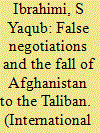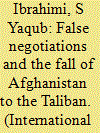|
|
|
Sort Order |
|
|
|
Items / Page
|
|
|
|
|
|
|
| Srl | Item |
| 1 |
ID:
188897


|
|
|
|
|
| Summary/Abstract |
This paper examines the dark side of Afghanistan’s peace negotiations that started under Donald Trump’s South Asia policy in Doha, Qatar, in September 2018 and ended, without a meaningful success, in December 2020. The paper examines both the United States–Taliban and the intra-Afghan negotiations and discusses the impact of the false negotiation behaviour by the Taliban and the Afghan government on the peace talks. It also explains how, in the absence of conditions for a political settlement, parties to the conflict acted as false negotiators, which resulted in the failure of efforts to launch a genuine peace process and in the Taliban’s military domination of Afghanistan.
|
|
|
|
|
|
|
|
|
|
|
|
|
|
|
|
| 2 |
ID:
188907


|
|
|
|
|
| Summary/Abstract |
This paper examines the dark side of Afghanistan’s peace negotiations that started under Donald Trump’s South Asia policy in Doha, Qatar, in September 2018 and ended, without a meaningful success, in December 2020. The paper examines both the United States–Taliban and the intra-Afghan negotiations and discusses the impact of the false negotiation behaviour by the Taliban and the Afghan government on the peace talks. It also explains how, in the absence of conditions for a political settlement, parties to the conflict acted as false negotiators, which resulted in the failure of efforts to launch a genuine peace process and in the Taliban’s military domination of Afghanistan.
|
|
|
|
|
|
|
|
|
|
|
|
|
|
|
|
| 3 |
ID:
173214


|
|
|
|
|
| Summary/Abstract |
Two decades after the 9/11 attacks, homegrown jihadist violence (HJV) in the West has almost disappeared, but the causes and conditions fomenting the phenomenon have not changed much. In this paper, I argue that, despite the security services’ ability to physically destroy the structures and networks of HJV in separate national contexts, the spectre of HJV is haunting theWest as a transnational problem. Dealing effectively with this problem requires a comprehensive understanding of the root causes of HJV and its cross-level and transnational origins. This paper examines such causes through the lens of International Relations’ levels of analysis, which allows us to categorize and explain those causes at individual, group, and international levels. The paper seeks to add new insight to the HJV literature and, at the same time, provide a pre-theoretical basis for a broader debate on the causes of this global security problem.
|
|
|
|
|
|
|
|
|
|
|
|
|
|
|
|
| 4 |
ID:
158959


|
|
|
|
|
| Summary/Abstract |
This paper examines the institutional and functional aspects of the Taliban’s Islamic Emirate of Afghanistan (IEA). The Taliban’s coercive approach and its entire reliance on “war-making” to “state-making” shows the difficulty of the transformation of an insurgent group into a state structure. The Taliban was primarily capable of establishing a two-track system of governance. However, the assessment of the IEA’s institutional and functional capabilities shows that the military–political organization formed by the Taliban lacked statehood in all three areas of legitimacy, authority and capacity.
|
|
|
|
|
|
|
|
|
|
|
|
|
|
|
|
| 5 |
ID:
175719


|
|
|
|
|
| Summary/Abstract |
In the post-Cold War era, “Jihadi-Salafi Groups” (JSGs) have emerged as significant “violence-making” organizations. Almost all JSGs have emerged in highly fragile states. The literature on the state fragility-terrorism nexus, by focusing exclusively on whether state fragility is a cause of terrorism or not, has failed to consider the broader impact of state fragility on the emergence of JSGs. The role of state fragility as a condition of the emergence of JSGs, in particular, is mostly overlooked in the literature. This paper, adding state fragility as a condition variable to the causal model of the rise of JSGs, fills this gap. The empirical basis of this research includes a single case study examining the relationship between state fragility in the post-Saddam Iraq and the formation of Islamic State (IS). By adding a new variable to the causal model of the rise of IS, this research makes a strong within-case inference concerning this case. Although the empirical basis of this research includes a single case study, the analytical framework developed in this paper has possible implications for studying a larger number of Jihadi-Salafi groups.
|
|
|
|
|
|
|
|
|
|
|
|
|
|
|
|
|
|
|
|
|